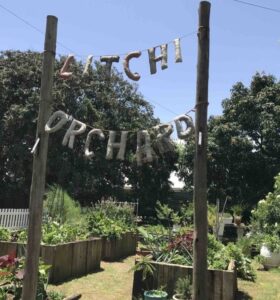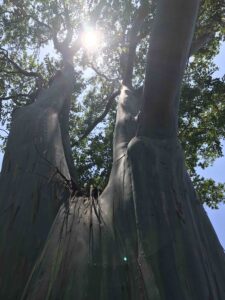[Above, a trail into the Drakensburg. All photos by Lucy Matthews.]
Advantage: Independent Traveler
As I paid for South African Lavender soap at the hotel gift shop checkout counter, the local university student who worked there part-time asked me if I had been to the Litchi Orchard. “My friends and I love to go,” she said, “It has good local musicians and fresh, healthy restaurants. Not a lot of tourists know about it.” Because my friend Elspeth and I were traveling independently in KwaZulu-Natal, South Africa, we had no set schedule that day and were able to take advantage of this local tip to visit a hidden gem off the beaten track of a package group tour.
On my first night at the hotel—about thirty miles outside KwaZulu-Natal’s largest city of Durban—the waiter told my friend and me that he had not often seen Americans in the region that weren’t on a package group tour. I was surprised.
I have always loved traveling on my own or with a friend and strongly believe that independent travel helps the visitor to immerse more fully in the distinct surroundings of a destination, to engage in more cross-cultural exchanges, and to discover places off the worn tourist track like the Litchi Orchard.
Why cater to independent travelers?
By visiting small towns, buying crafts, staying in local lodgings and more, independent tourists can contribute to local economies, engage with local communities, and have unforgettable experiences in places that group tours miss.
From the practitioner perspective, destinations can encourage more independent travel by providing easy access to resources for doing so—regional transportation options, day-tour operators, off-the-beaten track highlights, and information on thematic tourism routes. Following routes for independent travel requires advance planning, and that means tourists will begin learning about the area before they arrive and therefore be more thoughtful participants in the local culture. They will also be smaller in number than at more popular tourist spots. The routes therefore can bring in economic and cross-cultural benefits while not overwhelming small towns.
Most important for healthy destination tourism, independent travel can result in great stories—stories that can entice more travelers to visit. Read on for my own examples.
My Choice: KwaZulu-Natal
When I told friends I was going to visit South Africa, most assumed I would be heading to the popular international destination of Capetown. Someday I definitely want to visit Capetown as well, however my friend and I were drawn to explore a part of the nation less familiar to American tourists and located on the other side of the country, on the east coast by the Indian Ocean—beautiful KwaZulu-Natal (KZN), a land of mountains, beaches, and rolling sugarcane fields.
KwaZulu-Natal is a fascinating place full of a variety of influences. Even the name of the province bespeaks its inherent multiculturalism. KwaZulu means of the Zulus and Natal means Christmas in Portuguese, a reference to the visit here by Portuguese explorer Vasco Da Gama around Christmastime in 1497. You would have to stay for a while to truly understand the province, it is such a mix of environments, cultures, languages, and histories.
Our hotel was only 1 to 3 hours from many of the attractions of the province. Since we were traveling independently, we could book several private half- and full-day tours with guides to take us to some of the exciting destinations of KZN.
During our extended drives—to the city of Durban and to two diverse World Heritage Sites, the Drakensberg Mountains and the St. Lucia wetlands—we were able to have long conversations with our KZN guides. One was a South African of British heritage who told us about his experience growing up in Zululand. Another guide was Zulu and told us about his traditional upbringing and how he balances tradition with modern South African life. Since it was only my friend and me in the car, all our questions were answered and we had an excellent opportunity to really dig deep on issues we were interested in. As we passed traditional Zulu round houses, cane fields, gum trees, vendors selling pineapples by the side of the road, students selling lychees at tolls, rolling hills, and distant mountains, our guides would tell us about the countryside, about current South African politics, about navigating the many languages spoken in the country and in the region, and many other elements of South African and KZN history and current life.
Better Stories, Richer Memories
Because we traveled independently, we had the opportunity to meet many locals. On one of our private tours, our guide drove us to the Drakensberg Mountains. There we joined the hourly tour of the Khoi San cave paintings at Giants Rock. We were the only Americans. Everyone else on the cave tour was Zulu, and in fact the first portion of the tour was conducted entirely in Zulu. Claiming that it takes much longer to say something in Zulu than in English, our Zulu guide who had brought us from the hotel then paraphrased the cave tour guide’s fifteen-minute introductory speech in a few sentences.
One of the Zulu men on our tour asked to see what U.S. currency looks like, and a Zulu woman asked to take a picture with us. Seeming this exotic to locals made me truly feel that I was somewhere that Americans don’t often go. The experience of being the only two Americans for miles around would be impossible on a package, pre-scheduled group tour.
If I had traveled with a tour group I believe I would not have had as many cross-cultural interactions with South Africans, and may not have been as observant to my surroundings. Traveling independently also meant I was able to construct my own schedule based on what activities and sites interested me, and to spend some days exploring off-the-tourist-track places that were recommended by locals. Traveling independently in KwaZulu-Natal was certainly feasible with enough advance planning. I highly recommend it.
I regret that I did not have time to explore the Midlands Meander during my trip to KZN. Tourists can access resources at midlandsmeander.co.za to plan their trips based on their chosen activities and can explore the route at their own pace.
With a bit of careful planning from both the tourist and the practitioner, independent travel can be easy, creating lasting memories for the tourist, economic benefits for locals, and important connections between tourist and place.



